|
Pedagogical Prowess: a Teaching and Learning Series
We are proud to announce our themed virtual series this year focuses on teaching and learning. You have asked PAIS to design more programs for teachers and we responded! We are offering eight programs that cover a broad range of topics connected to all teachers and that elevate pedagogical prowess in the classroom and best practices in education.
Join live via Zoom or view the program recordings asynchronously.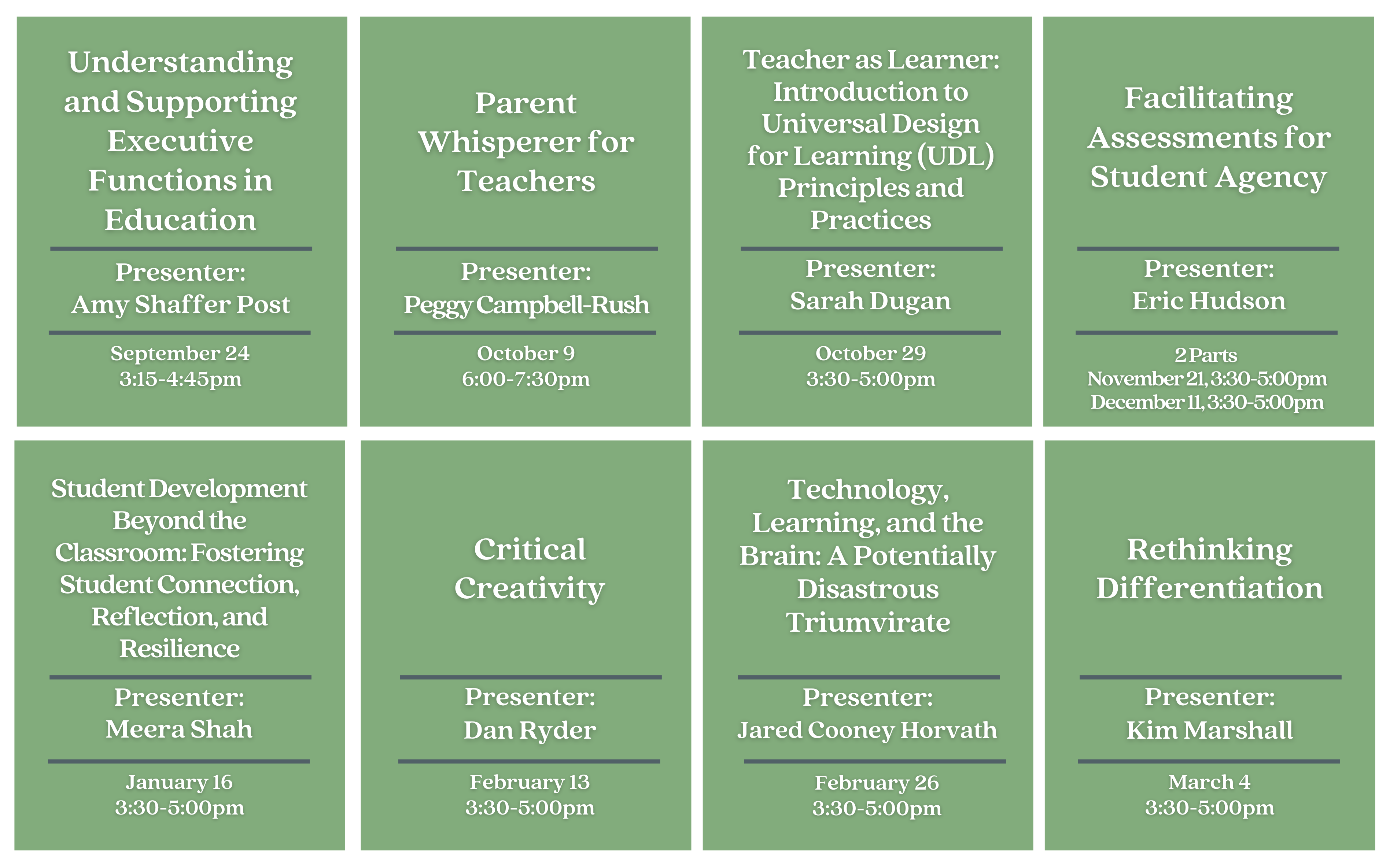
WHY SUBSCRIBE TO A SERIES?
Professional learning is a community activity! As a member of the series, all teachers and leaders in your school may participate in all programs, which is a great cost savings to your school. Since all programs are virtual, there are no hidden transportation costs and participants may either engage live or view the recordings asynchronously.
Use this series to promote professional development for 2024-25! View the programs as a division group, ask that teachers view and reflect on a certain number of programs in the series, and/or use the information to launch pedagogical discussions among your teachers. The ideas are endless! The series provides easy access for colleagues to hear the same message and you will meet expert presenters from the national scene.
Series are open to PAIS member schools only. Schools that do not register for the series may have participants register for individual programs for $50 per participant per program. Individual program registration will open in August 2024.
COST
$580 for schools less than 200 students, $780 for schools between 201-500 students, $980 for schools more than 500 students. Each school will select a point person for communication purposes and to serve as a liaison between the school and PAIS.

Registration for individual series webinars will open in August 2024.
INDIVIDUAL PROGRAM DETAILS:
Understanding and Supporting Executive Functions in Education
September 24, 3:15-4:45pm
Audience: all teachers, academic leaders
Join us for an enlightening session designed specifically for K-12 educators, where we delve into the pivotal role of executive functions in the classroom. Led by experienced school social worker Amy Shaffer Post, this presentation will provide invaluable insights into understanding, nurturing, and harnessing executive functions to enhance student success.
Executive functions are the cognitive processes responsible for goal-directed behavior, critical thinking, and self-regulation - essential skills for academic achievement and lifelong learning for all students. In this session, we will explore the significance of executive functions in the educational context and their impact on students’ ability to learn, problem-solve, and thrive in school.
Through engaging discussions and practical strategies, participants will gain a deeper understanding of how to identify executive function challenges in students and create supportive environments that foster their development. From organization and time management to impulse control and flexible thinking, attendees will learn evidence- based techniques to strengthen executive function skills and empower students to navigate academic tasks with confidence.
Whether you’re a seasoned educator or new to the field, this presentation offers valuable insights and actionable strategies to optimize learning environments and unlock the full potential of every student.
Meet the Presenter:
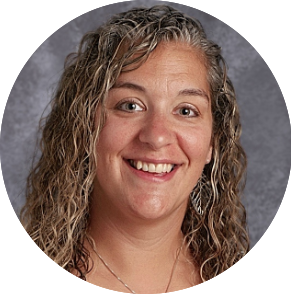 Amy Shaffer Post, Social Emotional Learning Counselor, Mercersburg Academy Amy Shaffer Post, Social Emotional Learning Counselor, Mercersburg Academy
Amy Shaffer Post is a dedicated advocate and licensed clinical social worker serving communities in Pennsylvania and Maryland. With over 13 years of experience within the educational system, Amy has been instrumental in supporting students across the K-12 spectrum. Her passion lies in empowering students with neurodivergent brains to access educational opportunities and express their knowledge effectively.
As a certified school social worker in Maryland, Amy brings a wealth of expertise to her role, specializing in addressing the needs of students with ADHD. Her commitment to this field is underscored by her pursuit of a doctorate in social work from the University of Tennessee, where she is focusing her research on understanding the unique requirements of students with ADHD.
Amy’s career is defined by her dedication to creating inclusive learning environments where every student can thrive. Through her clinical specialization in ADHD treatment and her ongoing academic pursuits, she continues to make significant strides in improving educational outcomes for neurodiverse learners.
Parent Whisperer for Teachers
October 9, 6-7:30pm
Audience: All teachers and academic leaders
The teacher-parent relationship is important, and often complicated. Do you ever feel that everything is going smoothly, until it isn’t? In this workshop, Peggy Campbell-Rush, will share some tried and true tips to help guide parent relationships, parent conferences and parent confidence in you and your teaching.
• How to best build lasting and positive relationships with all parents
• What parents are looking for divided by the four types of parent’s needs and wants
• What to do and say in a well-run parent conference
• How to gain the trust of parents
• Learn when and why to end a parent conference and what to do next
• Learn how to stay confident in all conversations and dealings with parents
Meet the Presenter:
Peggy Campbell-Rush
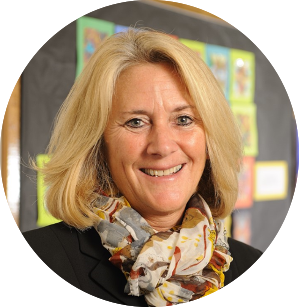 Peggy Campbell-Rush is currently a US Fulbright Education Specialist helping over 150 countries with educational best practices. She is nationally and internationally recognized education expert who has presented her keynotes and workshops at school and conferences around the world for over 34 years. Peggy is doing educational consulting in the US and abroad with teacher coaching, mentoring, instructional support for teachers and students. Peggy Campbell-Rush is currently a US Fulbright Education Specialist helping over 150 countries with educational best practices. She is nationally and internationally recognized education expert who has presented her keynotes and workshops at school and conferences around the world for over 34 years. Peggy is doing educational consulting in the US and abroad with teacher coaching, mentoring, instructional support for teachers and students.
Peggy retired as the Head of the Lower School at the Bolles School, Jacksonville, Florida. She has been in education for 47 years and has taught primary grades and has been an administrator in both the United States and England. Peggy has sailed around the world twice studying global education on the Semester at Sea Program. She has been honored as a Fulbright Specialist, Fulbright Fellow and two-time National Teachers Hall of Fame finalist, USA Today All-American Teacher Team award, two-time New Jersey Teacher of the Year finalist, named Wal-Mart Teacher of Year twice.
Teacher as Learner: Introduction to Universal Design for Learning (UDL) Principles and Practices
October 29, 3:30-5pm
Audience: All teachers and academic leaders
This hands-on, high-engagement workshop is designed for teachers who want to meet the needs of an ever more diverse range of learners. Participants will consider their own personal learner profile and use it as a lens to better understand learner variability in students. Participants will explore UDL principles and gain strategies and tools allowing them to
• Create a more equitable learning environment
• Develop lesson plans that embody a UDL approach, from objectives to learning tasks to checks for understanding
Meet the Presenter:
Sarah Dugan, Founder of Teach-Learn-Thrive
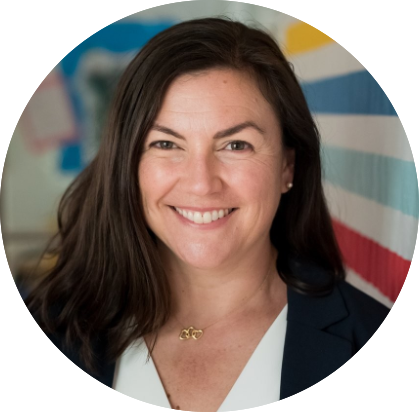 Building on two decades of teaching and leadership roles in DC-area schools, Sarah founded Teach Learn Thrive to support educators through effective and inspiring learning experiences. A regular presenter for PAIS, Sarah has offered professional growth for 450+ teachers and 100+ leaders. Teach Learn Thrive has grown into a hub of teacher-joy, where educators of all levels can connect with each other and re-dedicate themselves to their purpose through professional development, coaching, wellness programming, and more. Building on two decades of teaching and leadership roles in DC-area schools, Sarah founded Teach Learn Thrive to support educators through effective and inspiring learning experiences. A regular presenter for PAIS, Sarah has offered professional growth for 450+ teachers and 100+ leaders. Teach Learn Thrive has grown into a hub of teacher-joy, where educators of all levels can connect with each other and re-dedicate themselves to their purpose through professional development, coaching, wellness programming, and more.
Sarah received her B.A. in English Literature from Georgetown University, a M.Ed in Secondary Education, ELA focus, from George Washington University and she received training in Adaptive Schools and Cognitive Coaching.
Facilitating Assessments for Student Agency
2 Parts - November 21, 3:30-5pm and December 11, 3:30-5pm
Audience: All teachers and academic leaders (most applicable to teachers of children Grades 3-12)
Learner-centered assessment is not just about what we ask students to do, it’s about how we facilitate the assessment to support their sense of ownership and self-efficacy. In this session we’ll focus on three areas of facilitating learner-centered assessment: goal-setting, feedback, and reflection. We’ll learn and practice teaching strategies in each area that position students as leaders of their learning, exercising the core competencies that support agency like goal-setting, self-regulation, project management, and reflection. We’ll explore how to use the tools of learner-centered assessment (rubrics, portfolios, conferences, etc.) to elevate student voice and to guide students to do the hard but meaningful work of navigating complexity and embracing challenging work.
Meet the Presenter:
Eric Hudson
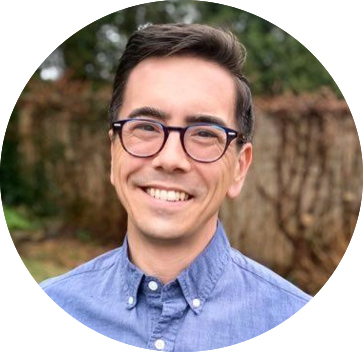 Learner-centered assessment is not just about what we ask students to do, it’s about how we facilitate the assessment to support their sense of ownership and self-efficacy. In this session we’ll focus on three areas of facilitating learner-centered assessment: goal-setting, feedback, and reflection. We’ll learn and practice teaching strategies in each area that position students as leaders of their learning, exercising the core competencies that support agency like goal-setting, self-regulation, project management, and reflection. We’ll explore how to use the tools of learner-centered assessment (rubrics, portfolios, conferences, etc.) to elevate student voice and to guide students to do the hard but meaningful work of navigating complexity and embracing challenging work. Learner-centered assessment is not just about what we ask students to do, it’s about how we facilitate the assessment to support their sense of ownership and self-efficacy. In this session we’ll focus on three areas of facilitating learner-centered assessment: goal-setting, feedback, and reflection. We’ll learn and practice teaching strategies in each area that position students as leaders of their learning, exercising the core competencies that support agency like goal-setting, self-regulation, project management, and reflection. We’ll explore how to use the tools of learner-centered assessment (rubrics, portfolios, conferences, etc.) to elevate student voice and to guide students to do the hard but meaningful work of navigating complexity and embracing challenging work.
Student Development Beyond the Classroom: Fostering Student Connection, Reflection, and Resilience
January 16, 3:30-5pm
Audience: Anyone with a role in student life grades 6-12
Student connection (or belonging) is critical for the healthy development and happiness of teenagers. How can we create opportunities and ultimately a culture in our school communities where students feel they matter and are connected? Let’s get specific about how advisory, clubs and organizations, your residential life program if you’re a boarding school, and your sports program can help. Learning how to move from being reactive (and often dramatic) to taking the time to reflect (and step outside ourselves and the drama) is an important stage of maturation for young people. It is also healthy. How can we incorporate even just a few minutes to step away and go through a process to review and think about what just happened and ultimately how that affects and relates to who we are fundamentally. No one sets out to develop grit and resilience–but it can be learned through deliberate practice. How can we help students name the struggle and the benefits that follow without making them cringe? In this workshop, participants will explore concrete and programmatic ways to foster connection, reflection, and resilience in our students. This interactive session is primarily for those who work with middle and upper school students, and is designed to include significant participant engagement.
Meet the Presenters:
Wendy Skinner
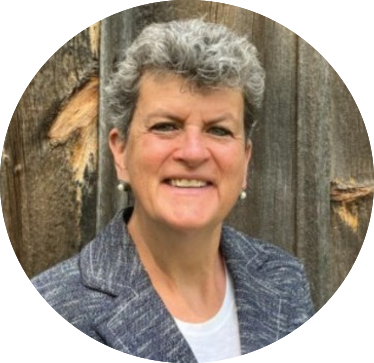 After earning a Bachelor’s degree in psychology and French from William Smith College and a Master’s degree in Teaching English to Speakers of Other Languages (TESOL) from Boston University, Wendy began her career teaching French and ESL, running dorms, and coaching at boarding and day schools. For the past 20 years, she has worked in a variety of administrative roles at co-ed and single gender schools: Dana Hall (MA), Oldfields School (MD), Shady Side Academy (PA), Western Reserve Academy (OH), and most recently at King’s Academy in Jordan. A believer in the unique power of deliberate communities, student life has been her focus and her passion and she looks forward to welcoming to and working with others in the student life realm and learning about and celebrating the challenges and opportunities this work brings! After earning a Bachelor’s degree in psychology and French from William Smith College and a Master’s degree in Teaching English to Speakers of Other Languages (TESOL) from Boston University, Wendy began her career teaching French and ESL, running dorms, and coaching at boarding and day schools. For the past 20 years, she has worked in a variety of administrative roles at co-ed and single gender schools: Dana Hall (MA), Oldfields School (MD), Shady Side Academy (PA), Western Reserve Academy (OH), and most recently at King’s Academy in Jordan. A believer in the unique power of deliberate communities, student life has been her focus and her passion and she looks forward to welcoming to and working with others in the student life realm and learning about and celebrating the challenges and opportunities this work brings!
Meera Shah, Educational Consultant and Founder, Trey Education
 As an independent school educator and academic leader for over two decades, Meera has mentored teachers, overseen the professional growth of faculty at the department and all-school level, run leadership teams, and shepherded curricular and programmatic change in schools. Meera founded Trey Education to help independent school leaders move their faculty and programs forward. As an independent school educator and academic leader for over two decades, Meera has mentored teachers, overseen the professional growth of faculty at the department and all-school level, run leadership teams, and shepherded curricular and programmatic change in schools. Meera founded Trey Education to help independent school leaders move their faculty and programs forward.
As a consultant, she's provided one-on-one thought partnership and mentorship for academic leaders, facilitated custom all-school leadership development programming for department chairs, coached teachers and developed teacher mentorship programs, facilitated team retreats, partnered with regional associations for professional learning, supported schools and leaders with program visioning and development, optimized schedules, conducted senior administrative searches; and more. In short, Meera provides strategic school leaders with added capacity, expertise, and third-party perspectives and facilitation. Meera partners with schools and leaders with the belief that change, growth, and empowerment are intertwined, and thus prioritizes authentic relationships, responsive design, and collaboration in her work.
Critical Creativity Across the Curriculum
February 13, 3:30-5pm
Audience: All teachers and academic leaders
How might we choreograph a short story, remix a political party, sketchnote an equation, costume a scientific phenomenon, or hashtag a nutrition plan? Explore how intentional acts of creative expression enable deeper learning and turn the creative spirit into a force for authentic understanding, in any classroom, from littles to bigs to beyond. And spend a weekday afternoon making and creating in the service of growing your own capacity for critical creativity.
Meet the Presenter:
Dan Ryder
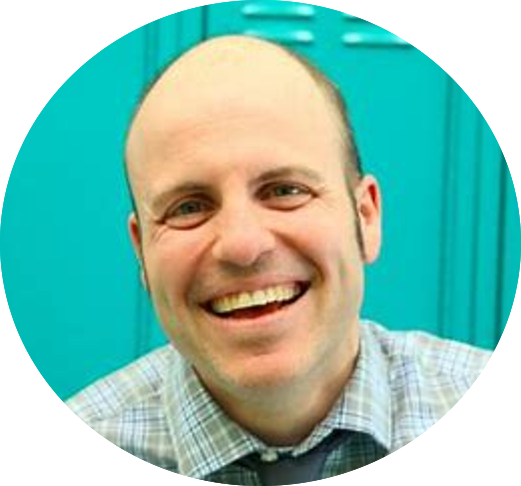 Idea wrangler, design thinker and head scratcher, Dan Ryder serves as Director of Design & Innovation at Community Regional Charter School, a public charter school in rural Skowhegan, Maine, that combines best practices of human centered design, restorative practices, and personalized learning. With 25 years of classroom teaching, recognition from state and national organizations (Apple Distinguished Educator 2017, Horace Mann NEA Foundation Award for Teaching Excellence 2018), Dan has experience integrating creativity and design thinking into humanities and STEM courses for struggling 7th graders through college-enrolled 12th graders. Co-author of INTENTION: Critical Creativity in the Classroom (Blend Learning 2019) he also directs, performs, and workshops improv comedy with his team, Teachers Lounge Mafia, and lives on social media as @wickeddecent. Idea wrangler, design thinker and head scratcher, Dan Ryder serves as Director of Design & Innovation at Community Regional Charter School, a public charter school in rural Skowhegan, Maine, that combines best practices of human centered design, restorative practices, and personalized learning. With 25 years of classroom teaching, recognition from state and national organizations (Apple Distinguished Educator 2017, Horace Mann NEA Foundation Award for Teaching Excellence 2018), Dan has experience integrating creativity and design thinking into humanities and STEM courses for struggling 7th graders through college-enrolled 12th graders. Co-author of INTENTION: Critical Creativity in the Classroom (Blend Learning 2019) he also directs, performs, and workshops improv comedy with his team, Teachers Lounge Mafia, and lives on social media as @wickeddecent.
Technology, Learning, and the Brain: A Potentially Disastrous Triumvirate
February 26, 3:30-5pm
Audience: All teachers and academic leaders (most applicable to teacher of children of grades 3-12)
Over 40 years of academic research has revealed that digital technologies by and large harm student learning and development. Unsurprisingly, EdTech companies have done little to address the underlying issues inherent in their tools; opting, instead, to promise the next iteration will solve all problems. Currently, the next iteration is ‘AI’ – a technological development which, unfortunately, is almost certainly going to continue the cycle of decreased learning and impaired development.
During this session, we will take a deep dive into the issue of digital technologies, consider how they impact student growth, and explore why they are so detrimental to learning. From this foundation, we can honestly and meaningfully ask the question “when and how can technology improve learning”, without wearing rose-tinged glasses or deferring to the empty talking points so often trotted out by enthusiasts. This might not be an easy discussion, but it will no doubt be helpful to anyone truly interested in student learning and healthy development.
Meet the Presenter:
Jared Cooney Horvath
Rethinking Differentiation
March 4, 3:30-5pm
Audience: All teachers and academic leaders
“What is the problem to which differentiation is the solution?” Clearly it’s the diversity of achievement levels and other variables in any classroom, which challenges teachers to meet all students’ needs. The conventional approach is to differentiate by content, process, and product, but that is a daunting challenge for teachers: Do I have do prepare 25 individualized lesson plans? There have also been significant criticisms of differentiation, including that it “balkanizes” classrooms, exhausts teachers, and doesn’t have a strong track record of producing results.
Instead, this workshop suggests that teachers approach the differentiation challenge by designing lessons with three questions in mind:
• What are students supposed to be learning?
• What is the best way to teach that content? and
• How will I know that all students are learning? A principal observing a class should have the same questions in mind.
These questions focus teachers and administrators on three logical phases of equitable instructional delivery: (a) Planning units and lessons that maximize access to learning for all students (following Universal Design for Learning principles); (b) teaching effectively, with frequent checks for understanding and appropriate adjustments; and (c) following up afterward with students who aren’t yet successful. Teachers should allocate their time, energy, and creativity among these three areas and set limits (especially on lesson preparation) so they are sharp and fresh every day.
Marshall addresses one other key outcome of effective, differentiated instruction: working strategically to make students increasingly self-reliant, so students continuously monitor their own performance and self-differentiate toward mastery of content and skills.
Meet the Presenter:
Kim Marshall
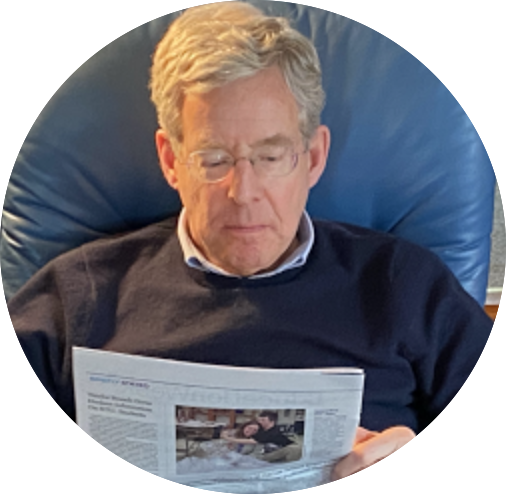 Kim Marshall began his career in 1969 teaching sixth graders (self-contained classes) in a Boston middle school. He used "learning stations" with some success, wrote curriculum materials for his students, gave workshops for teachers in the Boston area, and began to write articles on classroom and school innovation. During Boston's desegregation crisis in the mid-1970's, Kim became increasingly involved in schoolwide change efforts. Fascinated by the new research on effective urban schools, and eventually went to graduate school for a year to prepare to become a principal, studying with Ronald Edmonds, a leading researcher and activist in the field. Kim Marshall began his career in 1969 teaching sixth graders (self-contained classes) in a Boston middle school. He used "learning stations" with some success, wrote curriculum materials for his students, gave workshops for teachers in the Boston area, and began to write articles on classroom and school innovation. During Boston's desegregation crisis in the mid-1970's, Kim became increasingly involved in schoolwide change efforts. Fascinated by the new research on effective urban schools, and eventually went to graduate school for a year to prepare to become a principal, studying with Ronald Edmonds, a leading researcher and activist in the field.
In 1987, Kim finally got his wish and was made a principal. As leader of the Mather Elementary School for the next 15 years, Kim and his colleagues brought about significant improvements in teacher effectiveness, curriculum, assessments, and student achievement. The school also had a gala celebration of its 350th anniversary; the Mather, established in 1639, is the oldest elementary school in the nation. Since leaving the Mather in 2002, Kim has coached principals and spoken and consulted on teacher supervision and evaluation, time management, curriculum unit design, differentiation, effective use of during-the-year student assessments, and middle-school sex education. In 2003, he launched the weekly Marshall Memo, summarizing research and ideas for front-line educators.
|